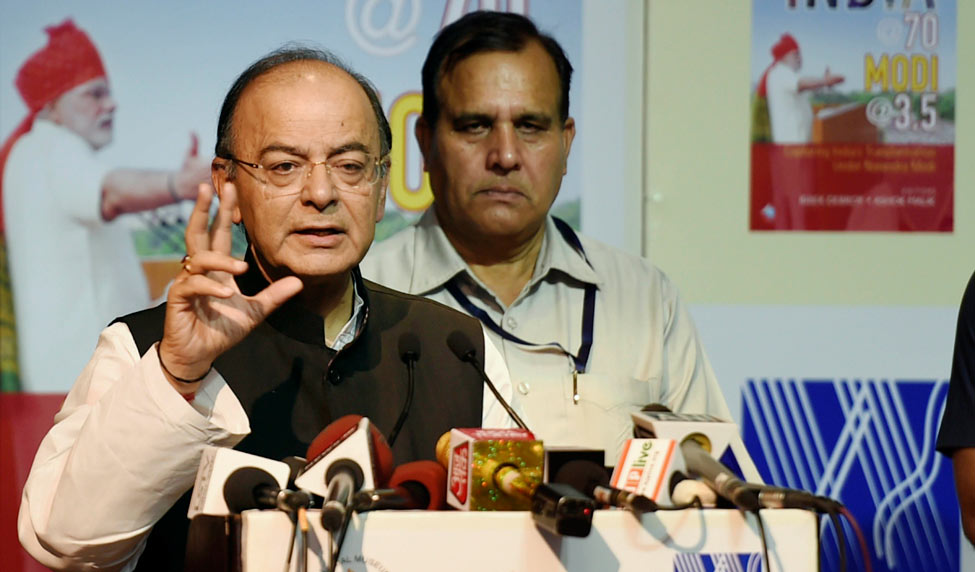The government's Rs 2.11-lakh crore recapitalisation plan may have come as a huge Diwali bonus to public sector banks (PSBs) distressed with mounting bad loans. Banking stocks jumped as much as 20-30 per cent as analysts and credit rating agencies gave a thumbs up to the move, which is expected to help state-owned banks shore up their balance sheets, make higher provisions for bad loans wherever necessary and also revive credit growth.
Indian banks are saddled with around Rs 8-lakh crore in non-performing assets (NPAs), with almost 70 per cent of it expected to be on the books of state-owned banks. The government is also keen to revive private sector investment and give a boost to the economy, which grew at its slowest pace in three years at 5.7 per cent in the quarter ended June 2017.
"The package will help PSBs to accelerate provisioning for stressed assets, speed up the NPA resolution process and support the clean-up of balance sheets. This will, in turn, help them focus on reviving credit growth," said Krishnan Sitaraman, senior director, Crisil Ratings.
Several state-owned banks have seen a sharp erosion in profits in the last couple of years as NPAs have risen and banks have had to make higher provisioning to account for them. This year, too, the picture is unlikely to be any different even as banks look to speed up the NPA resolution process through the insolvency and bankruptcy code.
According to Crisil estimates, state-owned banks required Rs 1.4-1.7-lakh crore in the event of accelerated provisioning as a part of the NPA resolution process.
Rising NPAs and private sector capital expenditure spending remaining subdued has led to a sharp drop in credit growth. The credit growth of all scheduled commercial banks slowed to 8.1 per cent in the year ended March 2017, from 10.9 per cent, a year ago, according to a study by Dun and Bradstreet.
"The bank recapitalisation plan is significantly positive for PSBs, given the quantum of capital infusion, as it will address both the issues of growth capital and capital required to absorb losses arising out of elevated provisioning requirement on NPAs," said Karthik Srinivasan, group head—financial sector ratings at ICRA.
According to the government's plan, Rs 1.35-lakh crore will come via sale of recapitalisation bonds, while the remaining will be through budgetary allocation and market fund-raising.
The bonds may be subscribed by banks, whereby their investments, net worth and hence, capitalisation will increase to the extent of recapitalisation bonds received by them, added Srinivasan.
Welcoming the move, Rajnish Kumar, the chairman of India's largest lender State Bank of India, termed it "bold" and "courageous", and one that was "the need of the hour." "It will generate balance in overall demand and supply by bringing more investments in sectors like infrastructure. These funds will also help in efficiently managing risk and credit capital related requirements of the banks," he added.
The government bank recapitalisation announcement and big infrastructure spending push, drove equity markets to fresh records on Wednesday. The BSE Sensex hit a high of 33,117.33 points in opening trades. It was later trading up 321 points or one per cent at 32,928.54.
Notably, the gains were led by state-owned banks—Punjab National Bank surged over 32 per cent, Bank of Baroda was up 23 per cent and State Bank of India, too, rose more than 21 per cent in morning trading.
"The government has killed multiple birds with a stone—provided a credible solution to banking mess, a credible attempt to revive private sector investments, huge support to SMEs (small and medium enterprises) and without slipping on the fiscal targets," said Sageraj Bariya, vice-president at East India Securities.
Others also termed it as a game changer.
"We are positively surprised by the quantum of the recapitalisation and it matches our estimates of capital requirements for PSBs for both NPA provisioning and some growth. Assuming the entire infusion is equity in nature, there would be significant dilution for minority investors, but given that current prices are higher than FY17 adjusted book values for most PSBs, this recap package should drive a re-rating in PSBs," said Adarsh Parasrampuria, analyst at Nomura Securities.






